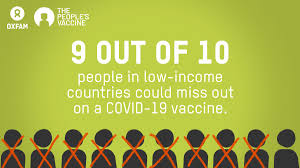The not-for-profit organisation said while nine out of 10 people in poor countries could miss out on the all-important vaccine, “rich nations could vaccinate everyone nearly three times.”
The head of the World Health Organisation had warned on Friday that the poor risked being “trampled” as wealthy nations roll out COVID-19 vaccines, which he said should be a public good.
Speaking at a virtual UN summit on the pandemic, WHO Director-General Tedros Adhanom Ghebreyesus said the world was seeing “light at the end of the tunnel” in the nearly year-long Covid crisis.
“But let me be clear. We simply cannot accept a world in which the poor and marginalized are trampled by the rich and powerful in the stampede for vaccines,” Tedros said.
“This is a global crisis and the solutions must be shared equitably as global public goods. Not as private commodities that widen inequalities and become yet another reason some people are left behind,” he said.
He also warned that the world has plenty of other challenges, saying: “There is no vaccine for poverty, no vaccine for hunger. There is no vaccine for inequality. There is no vaccine for climate change.”
The novel coronavirus has killed at least 1,557,814 people since the outbreak emerged in China last December, according to a tally from official sources compiled by AFP on Wednesday.
The United States is the worst-affected country with 286,338 deaths, followed by Brazil with 178,159, India with 141,360, Mexico with 110,874 and the UK with 62,033.
The Pfizer-BioNTech jab is one of several vaccines bringing hope for an end to the pandemic that has killed more than 1.5 million people worldwide and ravaged economies.
Frontrunners Pfizer-BioNTech and US biotech firm Moderna have reported efficacy of 95 percent and 94 percent respectively and have given data to regulators.
But Oxford University and AstraZeneca became the first Covid-19 vaccine makers to publish final-stage clinical trial data in a scientific journal.
The study, published in the Lancet medical journal, confirmed that their vaccine works in an average of 70 percent of cases.
Russia, one of Europe’s hardest-hit countries in terms of cases, on Saturday began vaccinating high-risk workers with its own jab, Sputnik V, and Beijing has also begun an emergency inoculation campaign with a medicine made in China.
The United States is expected to grant emergency authorization for the Pfizer-BioNTech vaccine later this week, announcing on Tuesday that no concerns had been found in trial data.
President-elect Joe Biden also pledged that his administration would carry out at least 100 million vaccinations in his first 100 days in office, a more conservative estimate than that offered by Trump officials.
Thousands of Britons became the first in the Western world to received an approved COVID-19 vaccine on Tuesday as the NHS began the biggest vaccination drive since it was created in 1948.
The vaccine is administered in two doses, 21 days apart. The over-80s and health and social care staff are first in line to get the jab in the national rollout.
Britain has received some 800,000 doses of the vaccine in the first batch of an order of 40 million. Up to four million doses are expected by the end of December.
Israel received its first batch of Pfizer’s coronavirus vaccine on Wednesday, with Prime Minister Benjamin Netanyahu declaring the pandemic’s end was “in sight” and vowing to get the first jab.
“This is a great celebration for Israel,” he said on the tarmac at Ben Gurion airport, near Tel Aviv, as a fork-lift truck started unloading the cargo from a red and yellow DHL air freighter.
The shipment was the first of eight million doses ordered from US pharmaceutical giant Pfizer BioNTech.
It came ahead of Hanukkah, the Jewish Festival of Lights, which begins on Thursday.
“The end is in sight,” Netanyahu said referring to the disease which has infected 348,948 Israelis, 2,932 of them fatally, according to a Wednesday update.
“What is important to me is that Israeli citizens get vaccinated,” he added.
The World Health Organization has warned that successful vaccines on their own will not immediately end the crisis.
source: Punch

 Amnesty International has warned that nine out of 10 people in poor countries are going to miss out on a COVID-19 vaccine next year.
Amnesty International has warned that nine out of 10 people in poor countries are going to miss out on a COVID-19 vaccine next year. 




